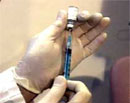|
Aids drugs 'can curb HIV
spread'
August 05, 2004
Medical research from Taiwan
has found that giving Aids drugs to people infected with HIV can reduce
transmission of the virus.
Researchers say it is strong evidence that providing Aids drugs to infected
people can be an effective way of curbing the epidemic.
 In
1997, Taiwan began providing modern, highly effective anti-retroviral drugs
to HIV-positive people free of charge. In
1997, Taiwan began providing modern, highly effective anti-retroviral drugs
to HIV-positive people free of charge.
The researchers say that since then, the infection rate has halved.
Meanwhile, the rates for other sexually transmitted diseases - syphilis and
gonorrhoea - have remained constant.
This proves, the researchers say, that it really is the drugs, rather than
any changes in people's behaviour, which are making the difference.
Strong evidence
Study after study has shown that modern anti-retroviral drugs keep
HIV-positive people alive, by suppressing levels of the virus in their
bodies.
But whether this also reduces the likelihood of them passing the virus on to
other people has been a matter of intense debate.
This new study, led by scientists at National Taiwan University and reported
in the Journal of Infectious Diseases, provides the strongest evidence yet.
Independent experts say this study provides another reason why anti-retrovirals
should be introduced into developing countries as soon as possible.
But they emphasise that other control measures, such as education and free
condoms, are also needed if the current global infection rate of around five
million people per year is to be reduced.
Keith Alcorn, senior editor of
NAM, a UK-based HIV information service, said: "This study shows that in a
country with a relatively small epidemic, introducing early treatment for
all who need it could curb the spread of HIV.
"It remains to be seen if it will have the same effect in countries like
South Africa, where one in five are infected and treatment will begin quite
late in the course of the disease.
"The key influences will be making sure that treatment is rolled out
quickly, and providing all the support that people need to take their
medicines every day."
Jo Robinson, at the UK HIV charity Terrence Higgins Trust, said: "This
research shows that HIV treatment can play an important part in reducing HIV
transmission, but it's only part of the story.
"People with HIV should have access to HIV treatment as an important right
for their own health, but we also need more choices in HIV prevention,
including more investment into HIV vaccines and microbicides.
"It is also vitally important that we provide good quality health promotion
information to people who are most at risk from HIV, as well as making
condoms readily available."
|